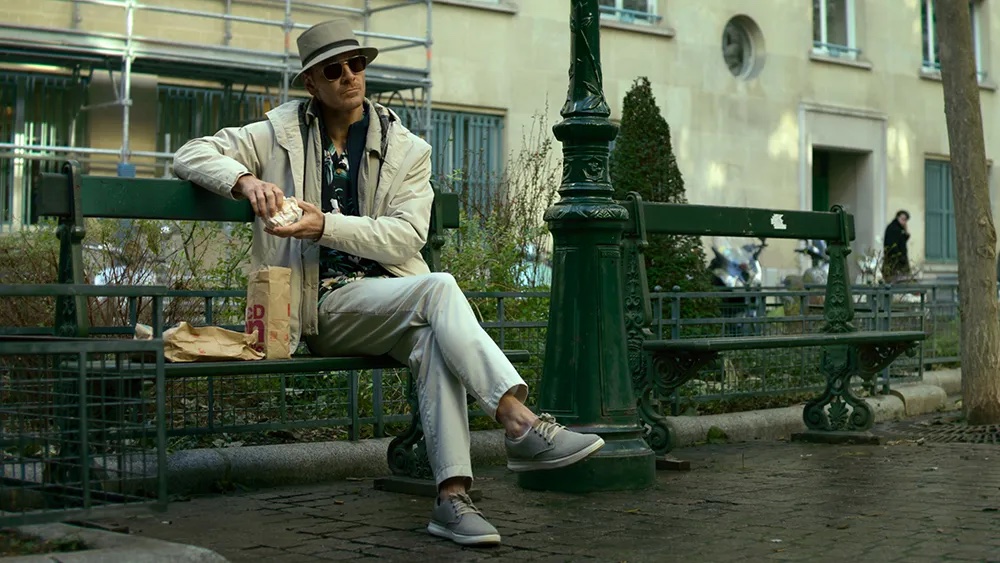
This has been a busy year for cinematic hitmen. In September, international film festivals premiered Michael Keaton’s Knox Goes Away, about an assassin diagnosed with dementia, and Richard Linklater’s Hit Man, a comedic adaptation of the true story of a man who posed as a hitman for years as part of a sting operation. David Fincher’s contribution to the genre leans considerably much more towards a darker vibe in the assassin space. The Killer is a precision-driven specimen designed to mimic its main character, whose most important job trait is to remain perfectly calibrated.
The unnamed assassin (Michael Fassbender) has an obsessive personality, to put it lightly. He’s rigidly meticulous, wearing gloves while staking out his next target and bringing portable surfaces with him on which to stretch and sleep so that he won’t leave any trace. He’s evidently an expert, but when his latest job finally seems ready to close, he misses the shot. Returning to his hideout in the Dominican Republic to find trails of blood and his partner in the hospital, he sets out to ensure that there’s no one left to threaten the only person who actually matters to him.
This is not a revenge movie, though it could easily be mistaken for one. The Killer operates by a strict code that demands he never get distracted by empathy, which leads to some questionable decisions, namely his choice of who to let live and who to kill despite the debatable nature of their guilt. He’s calm and emotionless, and he explains to the audience how it is that he can blend in and not be noticed in nearly every situation, ensuring an anonymous passage from country to country with a startling number of aliases and fake passports, not to mention puzzling frequent flyer status and airport lounge access.
Crafts are key to the effectiveness of The Killer, which once again demonstrates how so much of Netflix’s film slate includes content that deserves to be seen on a big screen. Reminiscent of the raging visual tour of a cell accompanied by music from The Dust Brothers at the start of Fight Club, the opening scene of The Killer features a carefully-cut montage with a score from Trent Reznor and Atticus Ross. It’s rare to find a playfully stylish introduction like that in film these days, and it almost makes it feel more like a caper film than a taut thriller that leaves little room for flexibility.
The film is expertly edited by Kirk Baxter, whose cinematic resume is made up almost entirely of collaborations with Fincher. The film is divided into chapters that identify the location or character featured within them, and each deliberately-paced scene feeds neatly into the next. The action sequences are particularly engaging, with fast hand-to-hand combat or a series of impressive getaways from a man who knows that he must at all costs not get caught.
Cinematographer Erik Messerschmidt and production designer Donald Graham Burt, who both won Oscars for Fincher’s previous film, Mank, work together to create an environment that’s extremely purposeful and speaks to the way The Killer moves through the world. Set in multiple countries, The Killer’s journey finds him traveling in different vehicles and tracking down the people on his list at their homes and offices, always assessing his surroundings to find the best and most seamless point of entry.
Sound designer Ken Klyce is also critical to the experience of this film, especially since Fassbender’s dry narration provides the only dialogue for the film’s first chapter and much of the later sequences. The specificity of a bullet shot and hitting its target or a brutal punch to the ground are emphasized in a way that makes the audience feel as if they’re experiencing them, at least in a theater. Whether that tangible translation of tension to even a large television with an impressive speaker at home will translate is a question mark.
Based on the French graphic novel of the same name written by Alexis Nolent and illustrated by Luc Jacamon, Fincher’s film manages to engross throughout, but there are also background elements that don’t entirely add up and make it hard to fully take seriously. No one should expect a film called The Killer to be free of moral quandaries it doesn’t adequately address, and that is the case here. But, despite a few moments of unaddressed conflict, it remains a fascinating and tightly-made thriller that knows how to keep an audience engaged.
Grade: B





